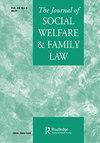“婚姻就是婚姻”:在没有孩子的短暂婚姻中平等分享
IF 0.6
Q2 LAW
引用次数: 0
摘要
E v L [2021] EWFC 60 (Fam)考虑了非常成功的生产经理L(丈夫,66岁)和E(妻子,61岁)的案例。2015年两人开始恋爱后,L几乎立即开始每月向E支付5000至1万英镑的经济支持。2016年订婚后,他们于2017年结婚,2019年分居,当时L将每月对E的支持减少到2500英镑。该法令于2020年10月获得批准,妻子向法院提出了申请。L对六项业务有兴趣,并达到了职业生涯的顶峰。E要求一次性支付550万英镑(她对婚后遗产的计算)。L的立场是,他应该支付60万英镑,并坚持认为,由于婚姻短暂,没有子女,这不是一个平等分享婚后遗产的案例,而应该局限于非常保守的评估需求。这个案例在离婚后分配财产时考虑了没有孩子和婚姻时间长短的重要性。在英格兰和威尔士,司法自由裁量决定了经济资源在当事人之间的分配,最终目的是实现公平的结果(White v White [2001] UKHL 54)。家庭法将婚姻视为一种双方做出平等或至少相似贡献的关系,双方作为共同企业的一部分共同合作(Fehlberg 2005, Douglas 2018)。公平的概念,以“平等的尺度”来衡量,考虑三个关键原则:(i)需要;(2)补偿;(iii)分享(Miller v Miller;McFarlane诉McFarlane [2006] UKHL 24)。虽然在大多数情况下,有限的资产意味着需要原则的应用是最重要的因素,但在“大钱”离婚中,需要只是考虑的原则之一(米勒;麦克法兰);任何解决方案“必须对有需要的申请人和必须支付的被告都是公平的”(North v North [2007] EWCA Civ 760,第7段)。32)。任何经济救济的基本目标都是在婚姻解除时实现双方之间的“公平”:本文章由计算机程序翻译,如有差异,请以英文原文为准。
‘A marriage is a marriage’: equal sharing in short, childless marriages
E v L [2021] EWFC 60 (Fam) considered the case of highly successful production manager, L (the husband, 66 years) and E (the wife, 61 years). Almost immediately after their relationship started in 2015, L began paying financial support to E of between £5,000 – £10,000 per month. Following their engagement in 2016, they married in 2017, separating in 2019, when L decreased his monthly support to E to £2,500 per month. The decree nisi was granted in October 2020, and the wife made an application to the court. L had interests in six businesses and had reached the pinnacle of his career. E was seeking a lump sum of £5.5 million (her calculation of the marital acquest). L’s position was that he should pay £600,000, maintaining that because of the short, childless nature of the marriage, this was not a case for equal sharing of the marital acquest, but one that should be confined to very conservatively assessed needs. This case considers the significance of childlessness and length of marriage when apportioning finances following divorce. In England and Wales, judicial discretion determines the distribution of economic resources between the parties, with the ultimate aim of achieving a fair outcome (White v White [2001] UKHL 54). Family law conceives of marriage as a relationship in which both parties make equal, or at least similar, contributions, with parties co-operating together as part of a joint enterprise (Fehlberg 2005, Douglas 2018). The concept of fairness, as measured by a ‘yardstick of equality’, considers three key principles: (i) needs; (ii) compensation; and (iii) sharing (Miller v Miller; McFarlane v McFarlane [2006] UKHL 24). Whilst in the majority of cases, limited assets mean that the application of the needs principle is the most significant factor, in ‘big money’ divorces needs are only one of the principles considered (Miller; McFarlane); any settlement ‘must be fair both to the applicant in need and to the respondent who must pay’ (North v North [2007] EWCA Civ 760, para. 32). The fundamental objective of any financial remedy is that of achieving ‘fairness’ between the parties upon dissolution of marriage:
求助全文
通过发布文献求助,成功后即可免费获取论文全文。
去求助
来源期刊
CiteScore
2.00
自引率
13.30%
发文量
52
期刊介绍:
The Journal of Social Welfare & Family Law is concerned with social and family law and policy in a UK, European and international context. The policy of the Editors and of the Editorial Board is to provide an interdisciplinary forum to which academics and professionals working in the social welfare and related fields may turn for guidance, comment and informed debate. Features: •Articles •Cases •European Section •Current Development •Ombudsman"s Section •Book Reviews

 求助内容:
求助内容: 应助结果提醒方式:
应助结果提醒方式:


